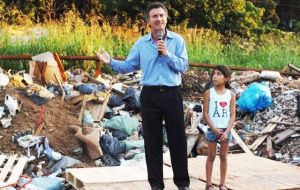MercoPress. South Atlantic News Agency
A third of Argentina's population live in poverty, according to the Catholic Church
 “We never promised we would turn poverty overnight”, said Macri who recalled that he admits the numbers, contrary to previous governments
“We never promised we would turn poverty overnight”, said Macri who recalled that he admits the numbers, contrary to previous governments Argentina urban poverty rate rose to 32.9% in the third quarter of 2016, which means 13 million people due to a precarious labor market and lack of long-term development policies, according to a report presented last week by the Social Debt Observatory from the Argentine Catholic University (UCA).
Reacting to the announcement the Social Development minister said that figures were 'painful' and president Mauricio Macri argued poverty can't be changed overnight, and only a strong, vigorous economy can overcome the situation, and that “is what we are working for”
The study establishes that in last year’s third quarter poverty increased 3.9% compared to the 2015 end of the year similar report, which means it is the highest reported. In addition, 2.7 million people (6.9% of the population) were described as indigent, 600,000 more than at the end of 2015.
“A large part of the Argentine population is excluded. Something more than economic growth is required” and “social programs are not enough to guarantee a platform of (lasting) inclusion,” said Agustin Salvia, head of the report, during the presentation of the results. Salvia argued that since president Mauricio Macri took office in December 2015, the increase in public services rates, the “anti-inflationary” policy, low private investment and the lack of recovery in the labor market have created an “even more recessive” scenario than previously.
Salvia pointed out that “mere cycles of economic expansion” will not manage to resolve the poverty problem since it is “structural” in Argentina, and poverty and indigence figures have been “stagnant” for a decade, and thus without the implementation of long-term development policies on the national, regional and local levels, plus measures supporting productivity in small and medium firms, “it is hard to see how this trend can be overcome.
The report also underlines that the “gap” between rich and poor has widened and for indigent households it has become desperately uphill to survive since subsidies have been limited and informal jobs and activities have been hit by the overall stagnation of the Argentine economy.
The report, “Poverty and inequality by income in urban Argentina 2010-2016,” also reveals that 52% of low-income households do not have access to at least one basic right such as healthcare, education or decent housing. Additionally 32.2% of those households “often go hungry”, where usually the more vulnerable members are children since these families are numerous, indicated Salvia.
The UCA report is based on a sample of 5,700 homes in 17 urban areas with more than 80,000 residents.
Following the release of the report, Social Development minister Carolina Stanley, said that the percentages are ”painful“, but we going ”to revert those numbers“. Stanley also admitted that in the first nine months of the current administration, 1.5 million Argentines had fallen into the poverty category.
Likewise president Mauricio Macri who made combating poverty one of his government's priorities admitted the figures are impacting, but ”we never promised we would turn the situation around overnight, and we also admit the report and have made official statistics reliable, something which was not the case with the previous administrations“.
In effect it must be remembered that in June 2015, then president Cristina Fernandez addressing a FAO general assembly in Rome announced that poverty in Argentina had fallen to below 5%, less than in Germany. And in March 2015 her Economy minister Axel Kicillof argued that poverty would no longer be measured since it was ”stigmatizing”.




Top Comments
Disclaimer & comment rules-

-

-

Read all commentsNo wonder why these guys seem to live in a bubble, they base their opinions solely off C5N. Wow! That's what I call heavy duty intellectual work.
Mar 17th, 2017 - 03:33 pm +7Enrique,
Mar 17th, 2017 - 06:13 pm +7I agree with your analysis. But the world has changed a great deal since the times of Frondizi. We are in trouble if we judge any government by the same traits of agro-export model.
Let's face it, we are locked in an agro-export mode and this will be so for years to come. Not that I like that lock in, but I'm just accepting that the chances of Argentina becoming an industrialized nation over night are practically null.
Populism is not the answer. I don't think Macri is the answer either.
People (working people of Argentina, not beneficiaries of handouts) want different than having to put up with tsunamis of paid protesters in the streets. (These protests are not an expression of hunger. Just take a good look at the pictures. None of them protesters seem malnourished to me).
You should try or at least attempt to urinate at the designated places.
Mar 17th, 2017 - 05:03 pm +5Commenting for this story is now closed.
If you have a Facebook account, become a fan and comment on our Facebook Page!